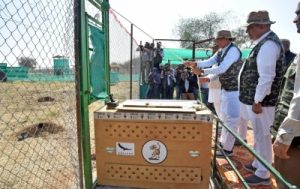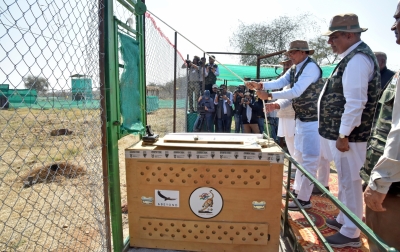
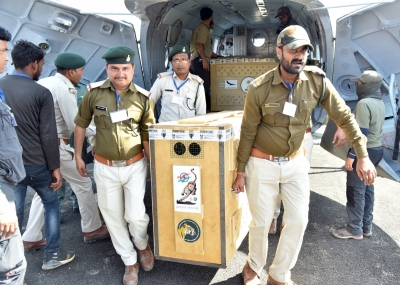
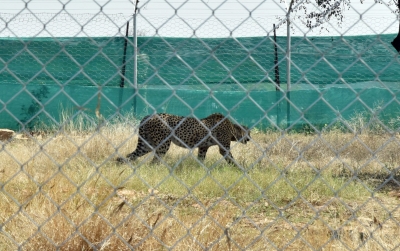
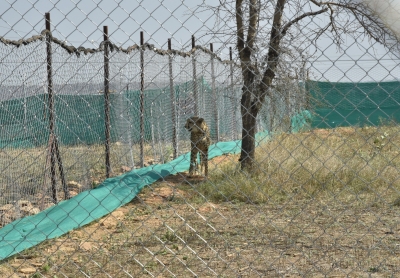 Bhopal, Feb 18 (IANS) The 12 cheetahs translocated to India by South Africa have been released at Kuno National Park (KNP) in Madhya Pradesh’s Sheopur district, taking the total count of big cats in the KNP to 20.
Bhopal, Feb 18 (IANS) The 12 cheetahs translocated to India by South Africa have been released at Kuno National Park (KNP) in Madhya Pradesh’s Sheopur district, taking the total count of big cats in the KNP to 20.
Earlier, eight cheetahs brought from Namibia were released at KNP on September 17 last year on the occasion of Prime Minister Narendra Modi’s birthday.
Indian Air Force’s (IAF) C-17 Globemaster plane, which took off from O.R. Tambo International Airport at Gauteng in South Africa, carrying these cheetahs reached Maharajpur air base around 10.30 a.m. and they were taken to Kuno in helicopters.
This time, cheetahs were released into mandatory quarantine bomas by the Union Environment Minister Bhupender Yadav and Madhya Pradesh Chief Minister Shivraj Singh Chouhan.
After releasing cheetahs into quarantine bomas, Chouhan said Prime Minister Narendra Modi has given another big gift to Madhya Pradesh on the occasion of Mahashivratri.
“Madhya Pradesh has got a gift on the occasion of Mahashivratri. I thank PM Modi from the bottom of my heart, it is his vision. The Cheetahs that had come earlier have adapted to KNP’s environment very well.
“One of the female big cats (of the first batch) was reported ill, but now she has recovered fully,” Chouhan added.
Meanwhile, the Chief Minister asserted that the arrival of cheetahs at KNP will not only help the tourism sector but give special importance to Madhya Pradesh in terms of wildlife.
He said that an increase in tourism would also pave the way for employment for the people living nearby Kuno or other areas in Madhya Pradesh.
Chouhan further said the Madhya Pradesh government is preparing a complete blueprint for the ‘cheetah project’, which will include various developments and activities.
“We are preparing a detailed ‘cheetah project’. Once the KNP is open for tourism, various things will be done which will give an economic growth to the state and people living here,” he added.
The cheetahs are being brought to India as part of the Cheetah Reintroduction project on the basis of the memorandum of understanding (MoU) signed between the South African and the Indian governments.
The MoU facilitates cooperation between the two countries to establish a viable and secure cheetah population in India; promotes conservation and ensures that expertise is shared and exchanged, and capacity is built to promote cheetah conservation.
This includes human-wildlife conflict resolution, capture and translocation of wildlife and community participation in conservation in the two countries.
–IANS
pd/pgh








